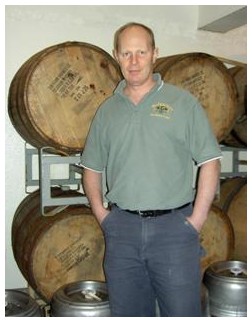What is an American Craft Brewer ?

 Beer is a sensual experience. Few can deny the initial salivation that occurs as one observes her favorite beer, spilling into the glass. Carbonation swirls within the glistening body. A head begins to form. Perhaps it is smooth and creamy, or piles like cumulonimbus clouds on a lemon meringue pie. Aromas waft through the air. If you have developed the habit of truly “tasting” beer, your nose begins to pick up the nuances of citrus, tropical or dark fruit, malt, toasted caramel, yeast, fresh bake-shop-breadiness, anise, licorice, toffee, cotton candy, leather, coriander, spruce tips, lavender, white pepper, heather, and…the list is endless. You pucker your lips, and allow the liquid to penetrate your pores. Taste-buds within your mouth stand firmly at attention, opening up to the sensory experience they are about to behold. Not only do they revel in taste, but in the total mouthfeel experience. Beer may feel smooth as silk, sliding across your tongue; it may prick like pine needles; dance like a hundred pounding hooves at the Kentucky Derby; or bite with assertiveness like Satan capturing your soul. It is Ravel's Bolero; Saint-Saens's Havanaise; Milt Jackson's Stairway to the Stars.
Beer is a sensual experience. Few can deny the initial salivation that occurs as one observes her favorite beer, spilling into the glass. Carbonation swirls within the glistening body. A head begins to form. Perhaps it is smooth and creamy, or piles like cumulonimbus clouds on a lemon meringue pie. Aromas waft through the air. If you have developed the habit of truly “tasting” beer, your nose begins to pick up the nuances of citrus, tropical or dark fruit, malt, toasted caramel, yeast, fresh bake-shop-breadiness, anise, licorice, toffee, cotton candy, leather, coriander, spruce tips, lavender, white pepper, heather, and…the list is endless. You pucker your lips, and allow the liquid to penetrate your pores. Taste-buds within your mouth stand firmly at attention, opening up to the sensory experience they are about to behold. Not only do they revel in taste, but in the total mouthfeel experience. Beer may feel smooth as silk, sliding across your tongue; it may prick like pine needles; dance like a hundred pounding hooves at the Kentucky Derby; or bite with assertiveness like Satan capturing your soul. It is Ravel's Bolero; Saint-Saens's Havanaise; Milt Jackson's Stairway to the Stars.
American Craft Brewers are committed to giving you this experience. They, too, may have slid through the childhood flavors of Mike’s Hard Lemonade, Bud Light, and Miller Chill, but somewhere along the way, they discovered that satisfaction comes from refinement. They committed themselves to crafting a noteworthy product, and in the process, provided jobs, stimulated American agriculture, improved the balance of trade, educated Americans about the history of beer, stimulated the culture and development of the United States, and promoted responsible consumption of beer as a drink of moderation. On April 4, 2006, The U.S. Congress established American Craft Beer Week with House Resolution 753, commending American Craft Brewers for the significant contributions they have made to the nation’s community, economy, and history. (Access H.R. 753 here.) This year, we celebrate American Craft Beer Week from May 12-18, 2008.
American Craft Beer Week 2008
In 2008, American Craft Beer Week celebrates “Brewers’ Community Citizenship.” As you walk through the gates of your favorite beer festival or event, you may only have glanced for a moment at the “proceeds to benefit” line at the foot of the poster. American Brewers take this line seriously. In 2007, they contributed more than $20 Million to charitable organizations. You heard that right: “Twenty MILLION Dollars!” Not only do craft brewers care about providing well-crafted beer to their patrons, but they also have big hearts.
What is the profile of an American Craft Brewer?
From my observation of craft brewers from Anchorage to Denver, and Wisconsin to Illinois, Tennessee to Texas, and Pennsylvania to Boston to Maine, they seem to share the following characteristics:
One thing is certain. They are passionate about their work.
Cheers!
You Should Also Read:
Brewing With Chris LaPierre - An Iron Hill Experience
Expert in Analytical Services - Gary Spedding PhD
Terroir and Beer

Related Articles
Editor's Picks Articles
Top Ten Articles
Previous Features
Site Map
Content copyright © 2023 by Carolyn Smagalski. All rights reserved.
This content was written by Carolyn Smagalski. If you wish to use this content in any manner, you need written permission. Contact Carolyn Smagalski for details.



